
December 21
1879 Birth: Joseph Stalin: Soviet statesman, leader of the Communist Party and dictator of the Soviet Union:
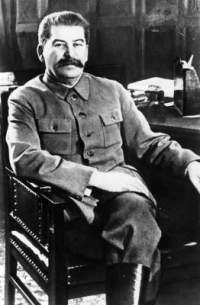
One of the most powerful and murderous dictators in history, Stalin was the supreme ruler of the Soviet Union for a quarter of a century. His regime of terror caused the death and suffering of tens of millions, but he also oversaw the war machine that played a key role in the defeat of Nazism. [For further information, click here]
1907 Death: Klara Hitler, of breast cancer:

Dr. Eduard Bloch: As weeks and months passed after the operation Frau Hitler's strength began visibly to fail. At most she could be out of bed for an hour or two a day. During this period Adolf spent most of his time around the house, to which his mother had returned. He slept in the tiny bedroom adjoining that of his mother so that he could be summoned at any time during the night. During the day he hovered about the large bed in which she lay.
An illness such as that suffered by Frau Hitler, there is usually a great amount of pain. She bore her burden well; unflinching and uncomplaining. But it seemed to torture her son. An anguished grimace would come over him when he saw pain contract her face. There was little that could be done. An injection of morphine from time to time would give temporary relief; but nothing lasting. Yet Adolf seemed enormously grateful even for these short periods of release. I shall never forget Klara Hitler during those days. She was forty eight at the time (Note: She was really 46.); tall, slender, and rather handsome, yet wasted by disease. She was soft-spoken, patient; more concerned about what would happen to her family than she was about her approaching death. She made no secret of these worries; or about the fact that most of her thoughts were for her son. "Adolf is still so young." she said repeatedly . . . .
He would watch her every movement, so that he might anticipate her slightest need. His eyes, which usually gazed mournfully into the distance, would light up whenever she was relieved of her pain . . . . In all my career, I have never seen anyone so prostate with grief as Adolf Hitler.
On Dec 21, Klara Hitler passes away quietly in her room. Adolf sits next to her and solemnly sketches her portrait in death.
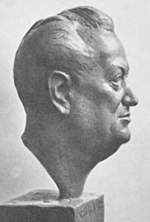
Sebottendorf
1913 Volkishness: Rudolf Glauer, now calling himself Rudolf von Sebottendorf, moves to Berlin, claiming to have been adopted by Baron Heinrich von Sebottendorff in Turkey in 1911. The Baron's family in Germany recognizes the adoption and seems genuinely fond of him. (THP)
1915 World War I: Sir William Robertson is appointed chief of the Imperial General Staff:
Shortly after Sir Douglas Haig is installed as the new commander-in-chief of the British forces, his steadfast supporter, Sir William Robertson, is appointed the new chief of the Imperial General Staff, with King George's backing and over the head of the embattled British war secretary, Sir Horatio Kitchener.
Robertson, who first enlisted as a private solder in 1877, became the only man in the British army to rise from such humble beginnings to the rank of field marshal by the end of the Great War.
1916 Volkishness: Germanenorden: Hermann Pohl informs Baron Sebottendorf that the Germanenorden has been reconstructed with Pohl, himself, as Chancellor. (Roots)
1917 Volkishness: Sebottendorff—who has communicated regularly with Pohl throughout 1917—attends the dedication ceremony of the reorganized Germanenorden in Berlin at Pohl's invitation. Sebottendorff offers to publish a monthly Order periodical and is formally elected Master of the Bavarian province.
1919 Emma Goldman: anarchist and feminist is deported from the USA to Russia.
1933 Various:
Volkishness: Rudolf von Sebottendorff returns to Munich to revive the Thule Society in the Third Reich. He quickly falls into disfavor with the Nazi authorities because of his claims as a precursor of National Socialism. (THP)
Otto Rahn publishes Crusade Against the Grail. Himmler greatly admires the book, and it soon becomes required SS reading.
The Italian Jewish community receives permission from the Fascist government to launch a fundraising drive to aid German-Jewish refugees.
The Italian Jewish community, one of the oldest in Europe, numbered about 50,000 in 1933. Jews had lived in Italy for over two thousand years. By the 1930s, Italian Jews were fully integrated into Italian culture and society. There was relatively little overt antisemitism among Italians. Although there were fanatical antisemites among the Fascist leaders, such as Achille Stararce and Roberto Farinacci, Italian Fascism did not focus on antisemitism. Until 1938, Jews could join the Fascist Party. In part under pressure from Nazi Germany and in part fearing that their "revolution" was not perceived as "real" in the Italian population, the Fascist regime passed antisemitic legislation beginning in 1938 . . . .
Having formally joined the Axis in 1939 . . . . Despite its alliance with Germany, the Fascist regime responded equivocally to German demands first to concentrate and then to deport Jews residing in Italian occupation zones in Yugoslavia, Greece, and France to killing centers in the German-occupied Poland. Italian military authorities generally refused to participate in mass murder of Jews or to permit deportations from Italy or Italian-occupied territory; and the Fascist leadership was both unable and unwilling to force the issue. Italian-occupied areas were therefore relatively safe for Jews. Between 1941 and 1943, thousands of Jews escaped from German-occupied territory to the Italian-occupied zones of France, Greece, and Yugoslavia. The Italian authorities even evacuated some 4,000 Jewish refugees to the Italian mainland. Incarcerated in southern Italy, these Jewish refugees survived the war . . . .
On September 8, 1943, Badoglio announced Italy's unconditional surrender to the Allies. The Germans, who had grown suspicious of Italian intentions, quickly occupied northern and central Italy. German forces also occupied the Italian zones in Yugoslavia, Greece, and France. SS paratroopers freed Mussolini from prison and installed him as the head of a pro-German Italian Social Republic (Repubblica Sociale Italiana; RSI), based in Salò in northern Italy. The German occupation of Italy radically altered the situation for the remaining 43,000 Italian Jews living in the northern half of the country. The Germans quickly established an SS and police apparatus, in part to deport the Italian Jews to Auschwitz-Birkenau.
1935 Death: Kurt Tucholsky: German-Jewish journalist, satirist and writer.
He also wrote under the pseudonyms Kaspar Hauser, Peter Panter, Theobald Tiger and Ignaz Wrobel. Born in Berlin-Moabit, he moved to Paris in 1924 and then to Sweden in 1930.
Tucholsky was one of the most important journalists of the Weimar Republic. As a politically engaged journalist and temporary co-editor of the weekly magazine Die Weltbuehne he proved himself to be a social critic in the tradition of Heinrich Heine. He was simultaneously a satirist, an author of satirical political revues, a songwriter and a poet. He saw himself as a left-wing democrat and pacifist and warned against anti-democratic tendencies – above all in politics, the military and justice – and the threat of National Socialism. His fears were confirmed when the Nazis came to power in 1933: his books were listed on the Nazi's censorship as "Entartete Kunst" (Degenerate Art) and burned, and he lost his German citizenship.
1937 Various:
Death: Frank Billings Kellogg: American lawyer, politician and statesman who served in the U.S. Senate and as U.S. Secretary of State. He co-authored the Kellogg-Briand Pact, for which he was awarded the Nobel Peace Prize in 1929.
From Ambassador Dodd's diary: notes on a conversation with Hjalmar Schacht:
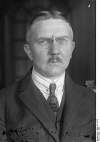
Schacht meant what the army chiefs of 1914 meant when they invaded Belgium, expecting to conquer France in 6 weeks; that is, domination and annexation of neighboring little countries, especially north and east. Much as he dislikes Hitler's dictatorship, he, like most of the remittent Germans, wishes annexation without war if possible; with war if the United States will keep hands off.
Palestine: Britain officially repudiates the Peel Commission's Partition Plan.

1939 Holocaust: Adolf Eichmann appointed by Hitler chief of "Referat IV B."
1941 Various:
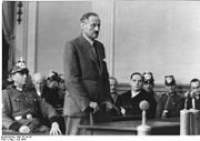
The Secret Diary of Anti-Hitler Conspirator Ulrich von Hassel: (Ebenhausen) I have been concerned and worried in the last weeks chiefly about various talks on the basic problems of a change of regime. One of the chief difficulties is Pfaff, who is sanguine, sees things always as he wishes they were, and is in many ways really "reactionary," although his other characteristics are exemplary. However, we finally reached agreement on the main points.
World War II: Joseph Goebbels speaks on the war situation after Pearl Harbor:
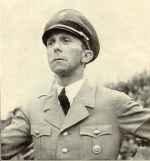
It is astonishing, hardly believable, how the state of the world can change entirely within a short time. Modern war speaks its own language, and ideas and principles that twenty years ago were standard military theory and practice are now entirely outdated and antiquated. If one compares the world situation of Sunday, 7 December, the day when Japan gave President Roosevelt the appropriate answer to his impudent provocations and shameless affronts, with today, one will without doubt conclude that the position of the Axis powers has improved in a way that even a few days before military and political experts would have thought highly improbable. All the confident predictions of the U.S.A. and England have collapsed. Those in Washington apparently thought the patience and untiring persistence of Japanese negotiators were signs of weakness. They were so surprised by the sudden attacking spirit of the Japanese army that they as yet have found no plausible explanation for what happened. The national enthusiasm, patriotic passion, and devotion of a military people have once again won a great triumph, while the liberal-democratic jugglers find themselves amidst the ruins of many of their vague hopes and dreams. These developments have not surprised us.
1942 World War II: From a letter from Alfred Rosenberg to Fritz Sauckel:
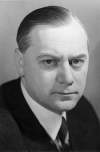
The reports I have received show that the increase of the guerilla bands in the Occupied Eastern Territories is largely due to the fact that the methods used for procuring laborers in these regions are felt to be forced measures of mass deportations, so that the endangered persons prefer to escape their fate by withdrawing into the woods or going to the guerilla bands . . . . Even if I in no way deny that the numbers demanded by the Reich Minister for Armament and Munitions as well as by the agricultural economy justify unusual and severe measures, I must, because I am answerable for the Occupied Eastern Territories, emphatically request that, in filling the quota demanded, measures be excluded the consequences and our toleration of which will someday be held against me and my collaborators.
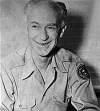
1943 World War II: Ernie Pyle: American war correspondent publishes Here Is Your War, a collection of his front-line dispatches that are popular with both soldiers and civilians alike.
1944 World War II: Various:
Alexander to Churchill:
In answer to your signal of December 19, I am most concerned that you should not know exactly what the true situation is and what we can do and cannot do. This is my duty. You would know the strength of British forces in Greece, and what additions I can send from Italian front if forced by circumstances to do so. Assuming that E.L.A.S. continue to fight, I estimate that it will be possible to clear the Athens-Piraeus are and thereafter to hold it securely, but this will not defeat E.L.A.S. and force them to surrender. We are not strong enough to go beyond this and undertake operations on the Greek mainland. During the German occupation they maintained between six and seven divisions on the mainland, in addition to the equivalent of four on the Greek islands. Even so they were unable to keep their communication open all the time, and I doubt if we will meet less strength and determination than they encountered. The German intentions on the Italian Front require careful watching. Recent events in the West and the disappearance and silence of 16th S.S. Division opposite Fifth U.S. Army indicates surprise move we must guard against. I mention these factors to make the military situation clear to you, and to emphasize that it is my opinion that the Greek problem cannot be solved by military measures. The answer must be found in the political field . . . . as I am convinced that further military action after we have cleared the Athens-Piraeus area is beyond our present strength.
Holocaust: More than 3,500 Jews, who had been evacuated from Auschwitz to Lieberose, are again evacuated, and forced to march in snow and ice to Sachsenhausen north of Oranienburg, outside Berlin. Several hundred, too sick to leave the infirmary, are shot and the building set on fire. Each morning, those who are too weak to walk are shot, and by the time the group reaches its destination, only 900 are still alive. (THP)
USA: Horse racing is banned in the United States until after the war.
1945 Death: George S. Patton: dynamic US general:

Descended from a long line of military men, Patton graduated from the West Point Military Academy in 1909. He represented the United States in the 1912 Olympics-as the first American participant in the pentathlon. He did not win a medal. He went on to serve in the Tank Corps during World War I, an experience that made Patton a dedicated proponent of tank warfare.
During World War II, as commander of the U.S. 7th Army, he captured Palermo, Sicily, in 1943 by just such means. Patton's audacity became evident in 1944, when, during the Battle of the Bulge, he employed an unorthodox strategy that involved a 90-degree pivoting move of his 3rd Army forces, enabling him to speedily relieve the besieged Allied defenders of Bastogne, Belgium.
Along the way, Patton's mouth proved as dangerous to his career as the Germans. When he berated and slapped a hospitalized soldier diagnosed with "shell shock," but whom Patton accused of "malingering," the press turned on him, and pressure was applied to cut him down to size. He might have found himself enjoying early retirement had not General Dwight Eisenhower and General George Marshall intervened on his behalf. After several months of inactivity, he was put back to work.
And work he did-at the Battle of the Bulge, during which Patton once again succeeded in employing a complex and quick-witted strategy, turning the German thrust into Bastogne into an Allied counterthrust, driving the Germans east across the Rhine. In March 1945, Patton's army swept through southern Germany into Czechoslovakia—which he was stopped from capturing by the Allies, out of respect for the Soviets' postwar political plans for Eastern Europe.
Patton had many gifts, but diplomacy was not one of them. After the war, while stationed in Germany, he criticized the process of denazification, the removal of former Nazi Party members from positions of political, administrative, and governmental power. His impolitic press statements questioning the policy caused Eisenhower to remove him as U.S. commander in Bavaria. He was transferred to the 15th Army Group, but in December of 1945 he suffered a broken neck in a car accident and died [aged 60] less than two weeks later. (History.com)
1948 Death: Seishiro Itagaki: Japanese general, Minister of War, hanged for war crimes. Japanese military officer in the Guandong Army. Seishiro Itagaki graduated from the Japanese Military Academy in 1904. He fought in the Russo-Japanese War in 1904-05. He was the commanding officer of the 33rd Regiment in China. As a Japanese military officer in the Kwantung Army from 1929 to 1934, he planned the 1931 Mukden Incident along with Kanji Ishiwara. He rose to the rank of lieutenant general with the Japanese Army. He became chief of staff of the Kwantung Army in 1936. He was appointed minister of war in 1938 and then chief of staff of the China Expeditionary Army in 1939. He attained the rank of general in the Japanese Army serving with the Chief Chosen Army in Korea in 1941. He was named Commander-in-Chief of the 17th Area Army in Korea in 1945. He became Commander-in-Chief of 7th Area Army in Singapore later that same year. He was condemned to death and hanged as a war criminal in 1948 by the International Military Tribunal for the Far East.
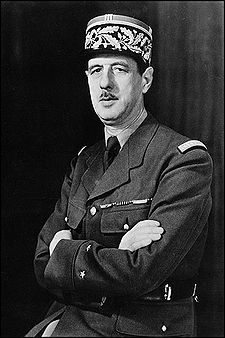
1958 De Gaulle elected:
Three months after a new French constitution was approved, Charles de Gaulle is elected the first president of the Fifth Republic by a sweeping majority of French voters. The previous June, France's World War II hero was called out of retirement to lead the country when a military and civilian revolt in Algeria threatened France's stability. [For further details, Click here.]
1972 Cold War: After nearly two decades of Cold War hostility, East and West Germany establish diplomatic ties in a treaty which commit them to good-neighborly relations, paving the way for international recognition of East Germany.
1991 Soviet republics proclaim the Commonwealth of Independent States:

In a final step signifying the dismemberment of the Soviet Union, 11 of the 12 Soviet republics declare that they are forming the Commonwealth of Independent States (CIS). Just a few days later, Soviet leader Mikhail Gorbachev announced he was stepping down from his position. The Soviet Union ceased to exist. [For further information, click here]
1993 KGB: Russian President Boris Yeltsin abruptly abolishes the former KGB security police, saying the huge force Russian citizens feared for decades is "incapable of being reformed."
2012 World Ends Today:
The 2012 phenomenon comprises a range of eschatological beliefs according to which cataclysmic or transformative events will occur on 21 December 2012. This date is regarded as the end-date of a 5,125-year cycle in the Mesoamerican Long Count calendar. Various astronomical alignments and numerological formulae have been proposed as pertaining to this date, though none have been accepted by mainstream scholarship. A New Age interpretation of this transition is that this date marks the start of a time in which Earth and its inhabitants may undergo a positive physical or spiritual transformation, and that 2012 may mark the beginning of a new era. Others suggest that the date marks the end of the world or a similar catastrophe. Scenarios suggested for the end of the world include the arrival of the next solar maximum, an interaction between Earth and the black hole at the centre of the galaxy, or Earth's collision with a planet called "Nibiru". Scholars from various disciplines have dismissed the idea of such cataclysmic events occurring in 2012. Mayanist scholars state that predictions of impending doom are not found in any of the extant classic Maya accounts, and that the idea that the Long Count calendar "ends" in 2012 misrepresents Maya history and culture. [For further information, click here]
Edited by Levi Bookin (Copy editor)
levi.bookin@gmail.com
FAIR USE NOTICE: This site may contain copyrighted material the use of which has not always been specifically authorized by the copyright owner. We are making such material available in our efforts to advance understanding of historical, political, human rights, economic, democracy, scientific, environmental, and social justice issues, etc. We believe this constitutes a 'fair use' of any such copyrighted material as provided for in section 107 of the US Copyright Law. In accordance with Title 17 U.S.C. Section 107, the material on this site is distributed without profit to those who have expressed a prior interest in receiving the included information for research and educational purposes. If you wish to use copyrighted material from this site for purposes of your own that go beyond 'fair use', you must obtain permission from the copyright owner.
Please note that the list-owner and the moderators are not responsible for, and do not necessarily approve of, the random ads placed on our pages by our web server. Unfortunately, they are the price one pays for a 'free' website.